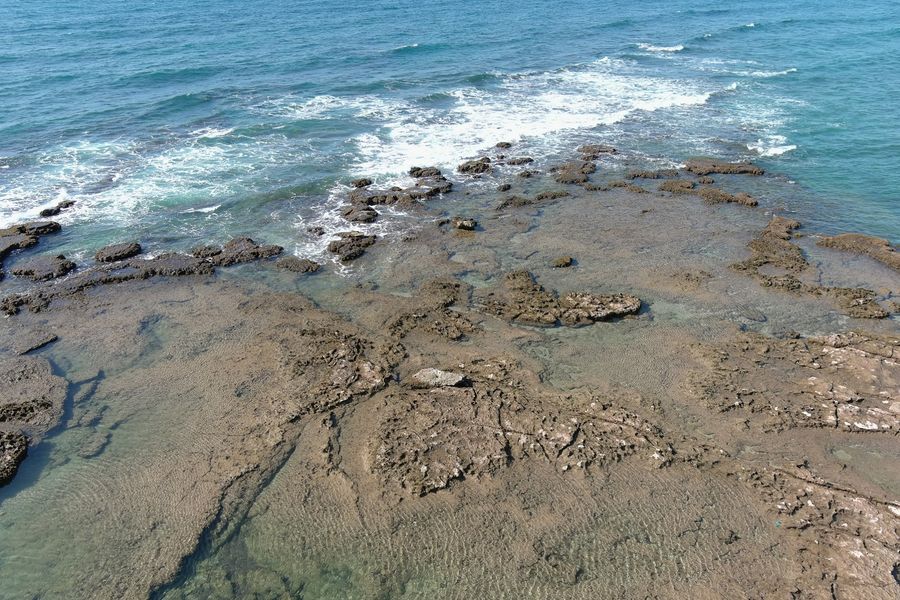The recent oil spill in the Eastern Mediterranean Sea that polluted the beaches of Israel and southern Lebanon has led to the worst ecological disaster in decades.
The European Maritime Safety Agency (EMSA) reported on 17 February about an oil slick located about 50 km off Israel’s coast but could not say for sure that it was the source of the pollution. The information reached Israel too late to take any measures to stop the oil tar from reaching its shores and polluting 170 km or about 40 percent of its beaches.
The disaster occurred during one of the worst winter storms in Israel and the whole region and a massive clean-up effort with thousands of volunteers started only after a few days and is still going on. While the beaches will be cleaned up after some time, the tar might remain for years in cliffs and in the sea bottom, ruining the ecosystem.
Despite Israel’s preparedness against terrorism and other security threats by all kinds of high-tech means, it was totally unprepared for this kind of environmental threat. It could have used its satellites, radars, drones and sensors in the water to discover the oil slick in time but no funding had been provided to those in charge of environmental protection to install and make use of such equipment.
In Israel, a court issued a gag order on disclosing any details about the on-going investigation – apparently to prevent the perpetrator from destroying any evidence -but according to reports in media and later confirmed by Israel’s Environment Protection Ministry the suspected vessel is the crude oil tanker Minerva Helen, sailing under Greek flag. The tanker is expected to arrive in Piraeus on Saturday.
The vessel was reportedly involved in a similar incident outside Copenhagen in 2008 but the Greek company that owns the ship denies any responsibility for what happened then and the recent oil spill in the Mediterranean Sea. In fact, this time the oil spill could have reached the beaches of two EU member states, Cyprus and Greece. In Greece, media have hardly reported on the incident.
EMSA, an EU agency established in 2002 and located in Lisbon, Portugal, is responsible for a wide range of activities to prevent pollution by ships and respond to pollution by ships and offshore oil and gas installations (CleanSeaNet). According to its website, as part of its surveillance capabilities, the agency provides services based on Remotely Piloted Aircraft Systems Services (RPAS), which use radar, optical and IR sensors to detect vessels and objects on the sea.
Small RPAS are also installed on oil response vessels chartered by EMSA and available to EU member states.
EU’s reaction
EU spokesperson Peter Sano told The Brussels Times that the EU delegation in Tel Aviv has tweeted about the incident and confirmed that EMSA informed the Israeli authorities about the oil slick but that is all. “Israel is investigating the spill and has not requested any EU assistance so far.”
Israel cooperates with the EU in several areas, in particular in research where it participates in the Horizon R&D programme as an associate state, but it has no agreement with EMSA. However, according to Israeli daily Haaretz (26 February), the Israeli environment ministry had been receiving satellite images on an on-going basis but this was discontinued, due to the way the satellites operate.
Ran Amir, head of the department for protection of the maritime environment at the Israeli ministry, said that even without an agreement, the ministry was supposed to receive a warning when a satellite identified a spill, based on the so-called Barcelona Process since 1995 and the Union for the Mediterranean, to which Israel is a signatory.
Asked about EMSA’s role and what it knows about the incident, a spokesperson for EMSA told The Brussels Times that EMSA does not have a legal basis to investigate pollution incidents on its own. This is a prerogative of the coastal and/or flag state.
The spokesperson confirmed that EMSA routinely monitors European waters for illegal discharges from ships and offshore platforms, and the results of this analysis are communicated in near real time (usually less than 20 minutes) to member states and to the beneficiary countries of European Neighbourhood Policy projects who have signed the Conditions of Use for this service.
Israel is not a user of the CleanSeaNet service and therefore its waters are not routinely monitored by the service, according to the spokesperson.
“Following a request received from the Israeli authorities and the Regional Marine Pollution Emergency Response Centre for the Mediterranean Sea (Rempec) on 17 February, we re-checked images obtained some days before in the Eastern Mediterranean and found two possible spills that could possibly be linked to the pollution incident to which you refer.”
“However, due to the fact that Israeli waters are not routinely monitored by CleanSeaNet and no alert and verification system was in place, it is impossible to say for sure that the spills detected are actually the ones causing the on-going pollution incident.”
Update: EMSA has clarified the dates of the discovery of the oil spill and its reporting to Israel. The request to EMSA from the Israeli authorities for information relating to any possible pollution detected in the previous days in the surrounding area was, as reported, received on 17 February.
Later that same day, EMSA informed the Israeli authorities that two possible oil spills had been identified as having occurred in the region since the beginning of February; one detected on 5 February and the other detected on 11 February, and transmitted the respective coordinates to them.
M. Apelblat
The Brussels Times

